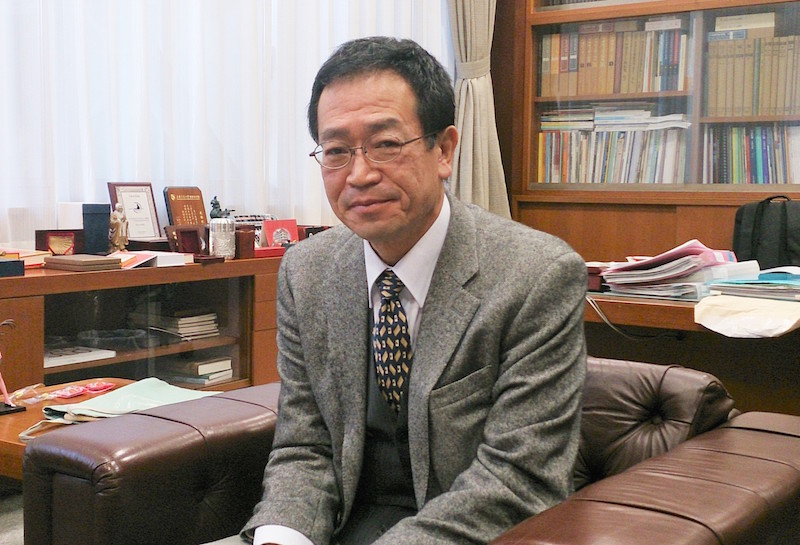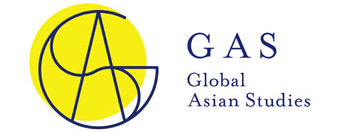An interview with Prof. Takamizawa Osamu, Director of the Institute for Advanced Studies on Asia, the University of Tokyo
Yijiang Zhong (Institute for Advanced Studies on Asia)

To start, could you briefly introduce your research specialties?
My specialty is Chinese law. I mainly look at laws of the late Qing, Republican, and Communist eras. Sometimes I also investigate into laws in Taiwan, Hong Kong and Macau, as well as laws prior to the late Qing. With regards to modern laws, I sometimes teach and write about modern Chinese laws in comparison with Japan, because the late Qing and Republican periods are easier to understand by way of a comparison with Japan of late Tokugawa through the Showa period.
Opinions from a specialist of China rather than Japan, like you, will be very instructive for the construction of the Global Japan Studies network. Can I ask about your opinions on Japan Studies at Todai?
I was trained in the Faculty of Law where I learned mostly laws of Japan. In graduate school, I studied Chinese law. From such a perspective, it appears there are different types of studies of Japanese law in Japan, and you sometimes feel there is Japanese law that is seen from outside Japan. The idea that the Japanese studies Japanese law is so taken for granted that scholars of Japanese law don’t think they are doing Japan studies. We researchers of foreign laws sometimes introduce Japanese law while abroad. In this sense we can look at Japanese law from the perspective of the Other. I can’t talk about Japanese law as a specialist in a specific area of law studies because I am not such a specialist. I can, however, look at Japanese law from outside and from the perspective of the Other; and also as a citizen who has right of speech. Between hesitating to talk because I am not a specialist and looking at the laws of my own country almost like an Other, there is no medium ground. This is perhaps unavoidable. Japanese scholars who study Anglo-American Law often introduce Japanese law when they go to the U.S. The same goes for scholars of French law. I introduce Japanese law when in China as well. The problem is that because I am not a specialist, I can’t talk in details and must stop at introducing the scholarship of Japanese law by Japanese scholars.
These are valuable observations. The lack of medium ground is in other words a gap. Next, could you share your thoughts on current situation of Japan Studies in Japan and overseas?
First, about study of Japanese law in China. There is a bias. There are some researches on Japanese Ritsuryo or Lü-Ling system, the pre-modern traditional penal and administrative legal system influenced by the Chinese system. There are also research on modern laws of Japan. There is, however, almost nobody studying the legal history of the medieval to early modern periods, or the late Heian to Tokugawa periods. There is certainly the difficult issue of reading Japanese classical texts. Several young researchers in China, however, showed interest in those areas. I want to try my best to provide assistance to them. In North America, there used to be more scholars of Japanese law but the number may have greatly decreased. Perhaps younger scholars are shifting to study of Chinese law. I heard in Australia you can get two Bachelor’s degrees after studying for five years. Some people study Japanese language or Japanese culture while getting a degree in law and becoming a lawyer. There are trainings for people to speak Japanese and to get a lawyer’s license in Australia. Again, there may be more and more people starting to learn Chinese and Chinese culture while studying Chinese law. Although students studying Japan are not that many, I think it is important to also encourage study of Japanese law overseas.
I think the fact that China is growing big should not be the reason for giving up study of Japan.
Right. For example, there is a usage called CJKV in the East Asian Studies department of Princeton University and maybe in the U.S. in general. For them, East Asia studies means studying China, Japan, Korea and, more recently Viet Nam as well, and to certain extent students study all the four languages albeit to various extent. So as you have seen, people from Princeton during the Princeton-Fudan-Todai conference in December 2014 can speak some Chinese when they speak Japanese well and speak some Japanese when they speak Chinese well. Of course you can’t find this high standard in all universities of the world. What about the University of Chicago? Do students of East Asia learn several East Asian languages?
That’s right. There are language requirements. You are not qualified to write the dissertation if you don’t meet those requirements. Finally, I would like to ask about your opinions and advice on the Global Japan Studies network.
The Institute for Advanced Studies on Asia (IASA) will try its best to provide institutional support to the Global Japan Studies. Whether GJS is based in the Institute or somewhere else, we will offer support and assistance. No matter what forms the support take, most important is to make sure that faculty and students enjoy their research and study. It is necessary nevertheless to improve fiscal situation by talking with the University and related offices. By the way, is GJS the same as PEAK or are they different?
They are different institutions. GJS is divided into the research part and the education part. The research part, located in IASA, is unrelated to PEAK. The education part is in the Faculty of Law, the purpose of which is to establish a Japan Studies program in English for people like exchange students.
Right. I think that is necessary. Looking from overseas, Asian Studies of course include Japan. On the other hand, in the case of the University of Tokyo there have been a kind of division of labor, with the Institute of Social Sciences doing research on modern Japan, the Historiographical Institute on pre-modern Japan, and IASA on Asia excluding Japan. When we formulate a problematic called Global Japan Studies, it appears then it is not a problem to study Japan in IASA. For example, anthropologists examine Asia as well as Okinawa. Taiwan studies become sometimes Japan studies. This applies to Korea too because of the dimension of colonial studies. It then seems difficult and unnatural for IASA not to study Japan. The GJS as we talk about it refers to such activities as disseminating research results in English or supporting researches on Japan conducted in English. But I think IASA can play a role in providing support to scholars doing Japan Studies in non-English, in particular Asian, languages in Asia. There may be many people in IASA more at home with Asian languages than with English.
IASA is a place with rich resources.
Yes. IASA can provide support in Chinese and Korean. Previously Professor Kano was here and he provided support for Japan Studies in Indonesia in Indonesian language. It will be great if we can increase such kind of activities. Another point about IASA. Research institutions abroad look at IASA as centering on humanity studies of East Asia. However, our idea of East Asian studies includes not just humanities but also social sciences and our definition of Asian Studies include South Asia and western Asia. I want to make a strong case for this point.
IASA is able to conduct strong research because of its multidisciplinary composition.
As you have seen, Prof. Masuya gave a presentation at the Princeton-Fudan-Todai conference last December. Prof. Masuya is a specialist of western Asia. That is, I think it is our job to widen and connect Asian Studies by gradually relating Japan Studies to East Asian Studies, and then relating East Asian Studies to an even wider Asian Studies.
Here comes to the end of the interview. Prof. Takamizawa, thank you very much.



